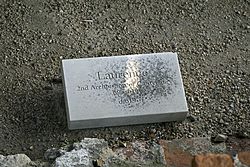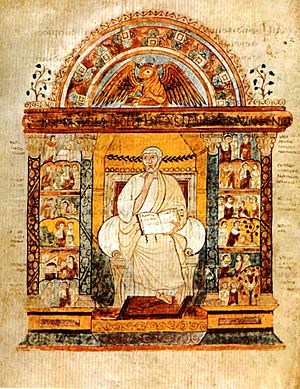Laurence of Canterbury facts for kids
Quick facts for kids Laurence |
|
|---|---|
| Archbishop of Canterbury | |

Gravestone marking the site of Laurence's burial in St Augustine's Abbey, Canterbury
|
|
| Appointed | c. 604 |
| Reign ended | 2 February 619 |
| Predecessor | Augustine of Canterbury |
| Successor | Mellitus |
| Orders | |
| Consecration | c. 604 |
| Personal details | |
| Died | 2 February 619 |
| Buried | St Augustine's Abbey |
| Sainthood | |
| Feast day | 3 February |
| Venerated in | |
| Canonized | Pre-Congregation |
| Shrines | St Augustine's Abbey |
Laurence (died 2 February 619) was an important early Christian leader in England. He was the second Archbishop of Canterbury, serving from about 604 to 619.
Laurence was part of a special group called the Gregorian mission. These missionaries came from Italy to England. Their goal was to teach the Anglo-Saxons about Christianity, moving them away from their traditional Anglo-Saxon paganism (their old religion).
Laurence became archbishop after Augustine of Canterbury. Augustine made Laurence archbishop while he was still alive. This was to make sure there was always a leader for the church. Laurence faced big challenges. After King Æthelberht of Kent died, the new king stopped being Christian. Laurence worked hard to bring the king back to Christianity, and he succeeded. After his death in 619, Laurence was honored as a saint.
Contents
Early Life and Mission
Laurence was a monk from Rome. He came to England as part of the Gregorian mission. This group was sent by Pope Gregory I to spread Christianity. Laurence arrived in England in 597, or possibly in 601.
He traveled back to Rome to report to Pope Gregory I. He told the Pope about the success of converting King Æthelberht of Kent. Laurence also carried a letter with questions from Augustine for the Pope. He returned to England in 601 with more missionaries.
Becoming Archbishop
Laurence became the Archbishop of Canterbury around 604. He held this important position until his death in 619. His predecessor, Augustine, had chosen Laurence to take over. Augustine wanted to make sure the church leadership continued smoothly.
Laurence kept in touch with the Pope in Rome. In 610, he sent another missionary, Mellitus, to Rome. Mellitus brought back advice from Pope Pope Boniface IV for the English Church.
In 613, Laurence dedicated a new church in Canterbury. This church was built by Augustine. It was first named after Saints Peter and Paul. Later, it became known as St Augustine's Abbey.
Challenges and Reconversion

A big challenge came in 616 when King Æthelberht died. His son, Eadbald of Kent, became the new king. Eadbald decided to stop being Christian and returned to the old pagan religion. This caused many missionaries to leave England.
Laurence stayed in Britain. He worked hard to convince King Eadbald to become Christian again. A famous story says that Laurence had a vision. In this vision, St Peter appeared and encouraged Laurence to continue his mission. Laurence then showed the king marks from this vision, and Eadbald decided to become Christian again.
Historians also believe there were other reasons for Eadbald's change of heart. Some suggest it was partly due to political reasons. Also, Laurence disagreed with Eadbald's marriage to his father's widow, which was against Christian rules.
Not all parts of England accepted Christianity easily. King Rædwald of East Anglia was a powerful ruler. He had accepted Christianity but also kept his old pagan beliefs. This made it hard for missionaries to spread the faith in his kingdom.
Death and Legacy
Laurence died on 2 February 619. He was buried in the abbey of St Peter and Paul in Canterbury. This abbey was later renamed St Augustine's Abbey.
Laurence is remembered as a saint. His feast day is celebrated on 3 February. His work helped Christianity survive in England during a difficult time. He was followed as Archbishop by Mellitus.
See also
 In Spanish: Lorenzo de Canterbury para niños
In Spanish: Lorenzo de Canterbury para niños
Images for kids
 | Valerie Thomas |
 | Frederick McKinley Jones |
 | George Edward Alcorn Jr. |
 | Thomas Mensah |


